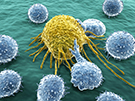
The most common types of cancer treatment are surgery, chemotherapy, and radiation, but we're well aware of their limitations. So, scientists are continually searching for new therapies.
One that's showing great promise is immunotherapy, a revival of an approach from a century ago. Immunotherapy activates a person's own immune system to fight cancer and there are three main types.
The first uses antibodies which are proteins produced by specialized immune cells. Antibodies recognize and attach to molecules on the surface of cancer cells killing them.
Another uses cytokines which are protein molecules that control the activities of the immune system much like the conductor of a symphony. Cytokines activate a myriad of molecules and cells in the immune system to destroy cancer cells.
Finally, there are cell-based therapies using T cells. Scientists extract these immune cells from tumors, grow them to high numbers in the lab, enhance their cancer killing properties, and reintroduce them into the body.
Lately we've seen remarkable results using cancer immunotherapy on melanoma, an aggressive skin cancer. Researchers recently identified a T cell protein, PD-1, that was inhibiting the cell's cancer killing potential. When they blocked PD-1, patients lived well beyond expected survival times.
In another study, this time with removing T cells from leukemia patients and reengineering them to recognize and target cancer cells, trials have shown 45 of 75 patients went into remission.
Cancer immunotherapy's potential is so promising that in 2013 it was named the 'Breakthrough of the Year'. Let's hope it continues to surprise us.
More Information
Breakthrough of the Year 2013
From the journal Science
Cancer Immunology
From Johns Hopkins Medicine
What Is Cancer Immunotherapy?
Nice infographic about cancer immunotherapy from the Cancer Research Institute